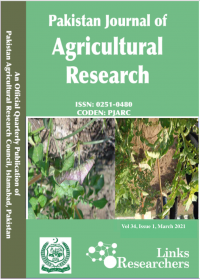Assessment of Stability for Seed Cotton Yield of Cotton Genotypes Across Different Environmental Conditions of Sindh Province
Zaheer Ahmed Deho*, Saifullah Abro and Muhammad Rizwan
ABSTRACT
Trials were carried out to evaluate seed cotton yield stability of cotton lines beneath four diverse climatic conditions. Three strains NIA-94, NIA-95 and NIA-96 and two commercial check varieties in Sindh province of Pakistan viz. Sadori and CRIS-342 were planted under four different locations Tando Jam, Mirpurkhas, Sakrand and Ghotki environment conditions. Seed cotton yield data was recorded from each location and stability analysis (genotype x environment interaction) was performed. The pooled analysis of variance for seed cotton yield, showed highly significant (P< 0.05) differences for varieties, locations and varieties × location interaction. The analysis depicted the significance of both the linear and non-linear components which showed the presence of individually expected and un-expected parts of genotype and environment interaction. Genotypes NIA-95, NIA-94 and NIA-96 produced high average yield (2339, 2280, 2128 Kgha-1) respectively having regression coefficient (bi) value 1.68,1.29, and 1.218 which indicated that these genotypes were specifically adapted to favorable environments. While, check variety Sadori with bi (0.98) showed wide adaptation to all environments. CRIS-134 showed regression coefficient (bi 0.714) somewhat close to unity 1.0 can be considered wide adaptable to some extent.
To share on other social networks, click on any share button. What are these?






